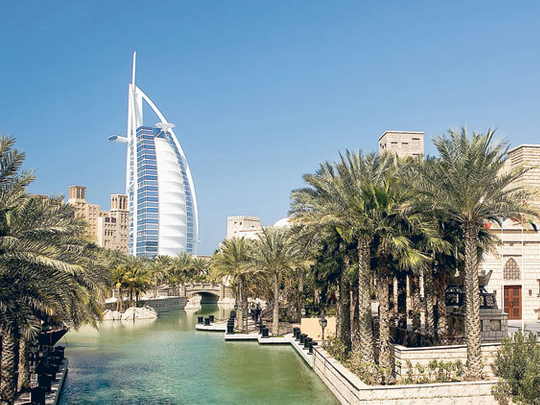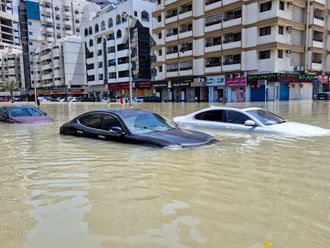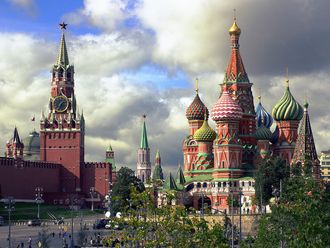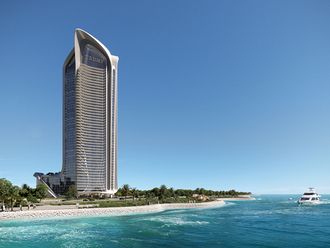
Full two years into fighting the global financial crisis, the UAE economy has come a long way from September 15, 2008, the day when the world watched with awe and dismay the collapse of global investment banking behemoth Lehman Brothers.
In the panic sell-off that followed in the global markets, asset prices tumbled across the globe leaving individuals, companies and governments with enormous financial losses. The UAE economy too has been no exception.
Although all stakeholders of the UAE economy have an arduous journey ahead in reconciling the trail of losses and restructuring the pile of debt left behind by the global financial crisis, international agencies, economists and financial experts believe that the UAE economy has steadfastly withstood the crisis and is poised for a steady recovery.
The International Monetary Fund (IMF) has projected a 1.5 per cent gross domestic product (GDP) growth for the UAE economy in 2010 with a strong outlook for current account balances in its latest regional economic outlook.
"We have been conservative in our growth projections for the UAE. This is the base case scenario. Going forward we expect the economy to grow at a much faster pace," said IMF Middle East and Central Asia Director Masoud Ahmad.
The IMF has forecast GDP to grow 3.1 per cent in 2011 with the overall economic recovery picking pace in the second half of this year. The latest IMF report on the UAE economy said that the non-oil segment of the economy was quick to recover last year from the impact of the global financial crisis. With oil prices gaining, the UAE is projected to post a current account surplus of $19.7 billion (Dh72.45 billion) in 2010 against a deficit of $7 billion last year.
Clear skies
The UAE's Ministry of Economy expects the GDP to grow by some 2.25 per cent this year as the country emerges from the turmoil caused by the financial slowdown.
"It is clear skies after the overcast conditions that followed the global economic crisis. Green shoots are visible all over and the outlook is essentially positive," said the Minister of Economy Sultan Bin Saeed Al Mansouri at recent gathering organised by the Dubai Chamber of Commerce. "Real GDP growth estimates for 2010 have ranged from a low of 0.6 per cent to a high of 3.2 per cent, with an average GDP growth rate estimate of 2.25 per cent."
Critics say that the UAE along with its Gulf neighbours were in a state of denial in the early stages of the financial crisis in 2007 as what began as subprime crisis in the US metamorphosed in to a full-blown global banking crisis. But the collapse of Lehman served as an eye opener.
The government insists that the UAE was quick in its response when the crisis hit the UAE shores. "The UAE was one of the first governments in the world that reassured investors and businesses by securing deposits, propping up the banking sector with enough liquidity and initiating steps to fill gaps in the legal regulatory framework of the country," said Al Mansouri.
Range of measures
Following the collapse of Lehman, the UAE government and the central bank were quick to secure its financial system from potential investor panic through a range of measures such as liquidity support to banks, deposit guarantee and recapitalisation of banks.
Although these measures instilled confidence in the stability of the UAE economy and the financial system, the global crisis did indeed take heavy toll on both private- and government-owned businesses. While the banks have been forced to write down several billions in provisions, several UAE establishments continue to face huge issues that need to be addressed.
"Two years into the global economic crisis one thing is crystal clear: The opinion that the crisis will be over in 24 months and that it will be business as usual after that has proven to be highly optimistic," said Shehab M. Gargash, Managing Director of Daman Investment.
"The reality is that tough economic times are with us for a while and that nations need to factor in a new set of realities in order to have a more realistic view of the environment in which they operate. The UAE is no exception to this new reality."
There is no quick fix for the problems the economy faces today, agrees Lieutenant General Dahi Khalfan Tamim, Dubai Police Chief and Head of the Government's Budget Committee. "The economic crisis might last for seven years due to the current financial situation," he said speaking at a traditional Ramadan gathering in Dubai recently. At the heart of the problem is the indebtedness of some of the Dubai government-related entities (GREs), private companies and individuals across the country. The IMF estimates the total Dubai debt at $109 billion.
At the end of May 2010, Dubai World announced its final debt restructuring for $14.4 billion of debt, the terms of which have been accepted by the creditor banks. Dubai World announced last week that as 99 per cent of creditors have accepted the terms, they will complete the restructuring in the coming months.
Analysts are optimistic that the government will tackle the debt issue without adversely impacting the international credit standing of both Dubai and the UAE. The near completion of Dubai World restructuring has come as a big relief to its creditors.
"With the Dubai World debt issue behind us, we expect business confidence to improve and the clear sliver lining for Dubai's economy is that Dubai's debt is mostly linked to its infrastructure that is going to be a key growth driver of the future," Khatija Haque, vice-president of Research at Shuaa Capital.
Many international bankers say despite the enormity of the debts, Dubai's problems are temporary and solvable as long as it can command the confidence of the global investors. "There is no more panic and overreaction in the market. Despite all the negative publicity Dubai received following the Dubai World Standstill announcement, Dubai Electricity and Water Authority's bond issue generated significant interest in the international market," A. Michael G.Rees, Group Executive Director & CEO of Wholesale Banking, Standard Chartered Group told Gulf News in a recent interview.
Dewa raised $1 billion through an international bond issue paying 8.5 per cent in May this year while the demand for the issue exceeded $11 billion. Analysts say investors know the recovery in the UAE could be quicker due to the fundamental strength of the federal economy and strong infrastructure.
All eyes on federal strength
The biggest strength of the UAE is its federal structure and the economy of the UAE when viewed as a single unit is in good health, according to economists and analysts.
The UAE's economic recovery has started gaining momentum and its real gross domestic product (GDP) is expected to grow two per cent this year and 2.7 per cent in 2011, the Institute of International Finance (IIF) said in a recent report.
"We view the UAE as a single economy. Abu Dhabi's robust economic fundamentals would drive the UAE's growth, while Dubai was expected return to growth in 2011," said Garbis Iradian, IIF's senior economist for Middle East-Africa Department.
"Dubai's debt refinancing challenges should be viewed in the context of the global financial crisis and overall strength of the UAE economy," he said.
Dubai's GDP represents 33 per cent of the UAE's GDP and 55 per cent of the UAE's non-hydrocarbon GDP. The IIF estimates Dubai's debt at about $107 billion, equivalent to 136 per cent of its GDP. The UAE had a net foreign asset position of $280 billion at end-2009, or about 130 per cent of GDP.
"The fallout from Dubai's debt problems will likely have a limited impact on growth prospects in the UAE," said Dr George Abed, IIF Senior Counsellor and Director.
Optimistic view
Analysts said though the sharp decline in the real estate prices and resolution of the debt overhang will be a drag on growth in the future through a reduction in investment and knock-on effects to consumption, there are compelling reasons to be optimistic on Dubai's growth prospects.
"The recovery in the global and regional economy is set to benefit Dubai as a regional hub. Dubai's competitiveness in this regard is well established. Moreover, its competitiveness has received a boost thanks to the real estate correction which has removed supply-side bottlenecks and improved the city's affordability," said Farouk Soussa, an economist with Citigroup.












